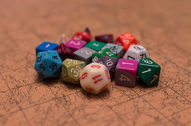|
I had such overwhelming interest when I last posted about this topic, I thought I would expand on it with this article. See below.  The scenario had been set for our adventurer, a long-time client with Asperger's. He had been playing a wizard, a magical healer. He had just learned that in a nearby village was a woman who needed healing. When he arrived at the woman's cottage, however, the woman refused to let him in. So, our young adventurer, our wizard, heroically broke down the woman's door, tackled her to the ground and healed her. Consequently, instead of being treated like a hero, he was chased out of own with pitchforks. The post-game discussion then revolved around why the villagers had reacted so angrily and a great lesson was learned! In the 1970's really the only tabletop RPG out there was Dungeons and Dragons, and because of its fantasy setting, garnered a poor reputation by some. In the 1980's there were a handful of other RPG systems that were also mostly fantasy based. Now there are published RPG's of every imaginable setting, or you can use any number systems to create your own RPG setting and scenario. Because of their flexibility, and their scenario driven format, tabletop RPG's can be a powerful tool to teach theory of mind concepts, cause and effect, and even actual historical and political settings. It does take some gaming literacy and a few key ingredients in order to create a successful role playing experience. Below are some general recommendations and guidelines, followed by three recommended role-playing systems for people starting out.
Here are three recommended gaming systems that will be helpful starting points for role playing with kids with Asperger's or high-functioning autism. You must READ the instructions well! Chronica Fudalis- This is a reasonably priced RPG system that is downloadable and printable. The setting it supports is realistic Medieval Europe so allows for the interweaving of historic events into the story. The example scenario laid out in the instructions is also very strong and helpful for a new game master. Primetime Adventures- Rather than using dice, this system uses card dealing as its core mechanic. It is intentionally formatted like a television show, with each game playing session being an "episode" for the season. This system can work for even kids around 10 years old in that television and episodes are not a new concept at that point. It also allows for many different settings in that television shows come in a variety of genres, subject matters, and settings. GURPS- With GURPS, or Generic Universal Role Play System, the sky is the limit when it comes to creating different worlds for your players to explore. Many for-purchase RPG's use GURPS as its foundation. Remember, role playing is best used as a naturalistic teaching experience in which active learning occurs throughout the game playing experience, rather than being set up from the beginning. Just like things happen in life that are unexpected that we have to deal with, this is the way with well-run RPG. Let the learning and fun happen naturally!
0 Comments
Leave a Reply. |
PurposeTo provide useful information to families regarding educational strategies, interventions, and tools. ArchivesCategories
All
|
 RSS Feed
RSS Feed